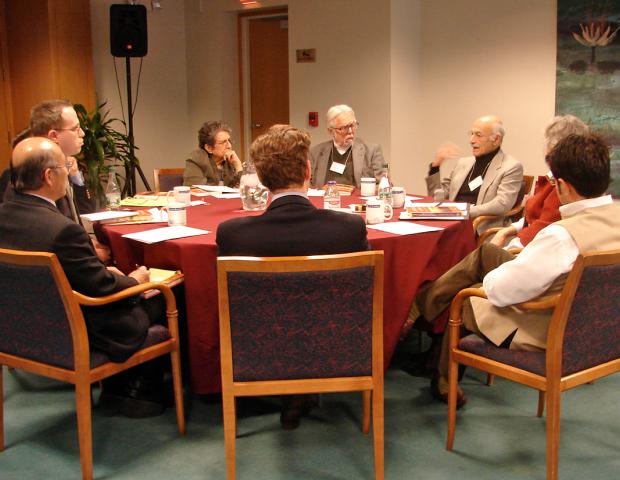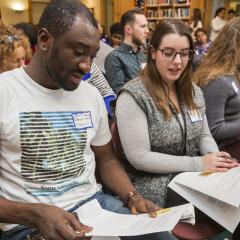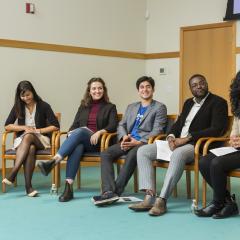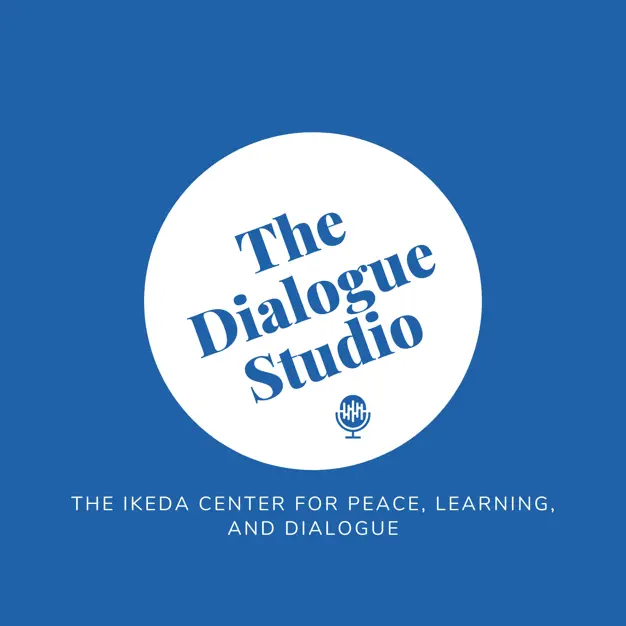Dialogue In a Divided World: A Seminar With Nur Yalman and Friends
A shared dedication to humanistic principles first brought Harvard professor Nur Yalman and BRC founder Daisaku Ikeda together in conversation. On February 19, 2009, the Ikeda Center celebrated the fruits of those conversations, hosting a seminar honoring the English-language publication of their dialogue A Passage to Peace: Global Solutions From East and West, first published in Japan in 2007. Joining Professor Yalman, a noted social anthropologist, were several of his Harvard colleagues, including Islam scholar Shahab Ahmed, Divinity School professors Leila Ahmed and Harvey Cox, Divinity School Dean William Graham, and law professor Noah Feldman. This article by Mitch Bogen reports on their discussion.
: :
The seminar opened with brief comments from the BRC’s executive director Virginia Benson and president Masao Yokota, who discussed President Ikeda’s belief in the establishment of personal connection as the best way to build meaningful dialogue. The goal of such dialogues, said Yokota, is to learn from others and to share those findings in the cause of developing a new global humanism.
After thanking his colleagues for attending, Professor Yalman, a native of Turkey, remarked that he relished the opportunity to engage in dialogue with President Ikeda, in large part because he admires Ikeda’s commitment to nuclear disarmament and the cause of peace. Beyond that, he enjoyed exploring what he called “the surprising connections” that exist between Turkish and Japanese cultures, including the strong structural similarities in the languages. Making such connections, he said, functions as a vital rejection of the kind of intercultural suspicion and prejudice popularized most recently by Samuel Huntington’s “clash of civilizations” hypothesis.
During the discussion, participants explored the challenges of pursuing dialogue in a world marked by severe divisions of power and ideology.
Professor Cox, a best-selling author and a leading American theologian, launched the discussion on a skeptical note, observing that, too often, the quest for commonalities in interfaith dialogue serves to paper over important differences. The hardest task, he said, is not so much talking with open-minded persons from other traditions, but rather with the fundamentalists within one’s own tradition. Professor Leila Ahmed added that while there is certainly value in the erosion of our differences, the resulting common ground is, by default, usually indistinguishable from “American ground” – the implication being that the quest for global intercultural agreement might often be Americanization by another name.
Because of these kinds of pitfalls, Professor Graham said that he has come to value the pursuit of the “tertium quid,” where diverse groups focus on our “common concerns as human beings.” The focus can be on poverty or music or art or politics, or any number of things, said Graham, but in pursuit of common cause, differences can be experienced as energizing rather than threatening. Virginia Benson noted that this idea has animated Ikeda’s many dialogues and has also served to focus BRC publications such as Subverting Hatred and Subverting Greed.
The pursuit of successful dialogue can be severely hampered by the power differences that persist in our world.Opting to throw what he called “a little cold water” on Graham’s assertion, Professor Feldman noted that not long ago adversarial religious leaders in Jerusalem found common ground in their opposition to a gay pride parade. What is needed, said Feldman, is a “serious discussion about the right way to live.” Professor Shahab Ahmed added a point that he deemed somewhat “obvious,” but important nonetheless: The pursuit of successful dialogue can be severely hampered by the power differences that persist among persons and groups in our world. He said that dialogue is a term of “anodyne virtue,” as it assumes that people are in the same place in terms of power. Pushing further, Ahmed questioned the virtue of the term peace in seeking a better world. After all, he said, the aftermath of genocide might even be said to be “peaceful.”
The group also tackled the limitations of humanism as a framework for guiding the quest for global peace. Again, Shahab Ahmed pointed to the distorting impact of power. Even a concept such as humanism, he suggested, can be utilized by the powerful as a source of self-justification and as a way to deny the humanity of others. Participants agreed that this has indeed been the case with what is known as the “Renaissance humanism” of Western Europe, and that this biased dynamic has long fueled the West’s attitude toward the Muslim world as somehow less than human.
Huntington’s thesis, which Professor Yalman earlier had identified as an especially pernicious one, demonstrates the reality of this bias, said several of the participants. It never occurred to Huntington, said Shahab Ahmed, that it might be the West that is the force of darkness and not vice versa. Professor Yalman and others said that the Huntington thesis became as popular as it did precisely because it confirmed “ancient prejudice.” Professor Feldman added that the thesis also caught on because the events of 9-11 and the U.S. response seemed to confirm its argument, since both sets of actors – al Qeada and the U.S. government – accepted the inevitably of violent conflict.
One effect of the substantial critical thinking that occurred during the conversation was to set in relief a core humanistic conviction: that, as Professor Graham phrased it, there are “humane possibilities for dialogue across power.” As the end of the session neared, Graham warned against throwing the baby of humanism out with the bathwater, so to speak. Despite past failures of the humanistic project, it would be dangerous, he said, to lose the notion that our humanity is more fundamental than anything. He urged everyone to uphold “the intrinsic value” of human beings across all categories.
Throughout the discussion, Professor Yalman also underscored the value of humanistic principles of the kind that inspired him to co-create the Passage to Peace dialogue with President Ikeda. Acknowledging Professor Cox’s opening concern about the homogenization that can result from superficial agreement among religions, he maintained that it is still vital “to go beyond differences and see what this means for human beings and their lives together.” Yalman also conceded that “across great differences” in power, it is quite difficult for dialogue to happen, but clarified that his dialogue with Ikeda was not of that type. Rather, it was dialogue between peers, aimed at promoting education and creating value through shared understanding.
Ultimately, said Yalman, valorization of human life is the key. And in keeping with that notion, we should understand that all killing is unacceptable, even when it appears justified. The path forward consists first of all, said Yalman, in keeping “right in front of us” at all times, Andre Gide’s injunction that “the individual is the most irreplaceable of beings.” Further, to achieve a better world, we must concentrate on the concept of justice, the rule of law, and human rights – imperatives that require crucial support from international institutions such as the United Nations and regional courts of human rights.
During his closing remarks, Yalman remarked on the great sense of hope he is witnessing around the world because of the election of Barack Obama – from students celebrating in Indonesia to expressions of optimism in Istanbul. Our role is to support the hope of others, and maintain our own hope as well, he said. In conclusion, Professor Yalman said to the assembled scholars, “How nice to bring all my friends together!”
It is usually not the expectation that wide-ranging discussions such as this will result in consensus, but as participants gathered their coats and prepared to face the cold New England evening, Benson inquired of professors Noah Feldman and Shahab Ahmed, two of the session’s Socratic skeptics, what terms they might use for those humane ideals and goals we can agree upon across differences, if not humanism or peace. Both peace with justice and human flourishing are good, suggested Feldman. Peace with justice, agreed Ahmed.



